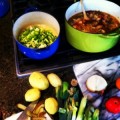For the next 40 days, I am a vegetarian. This — giving up meat for Lent — has become a tradition of mine. It started a couple years ago when my family got involved in Operation Rice Bowl through my kids’ school. Operation Rice Bowl is a program that helps people connect with people in need around the world by inviting participants to “… fast in solidarity with those who hunger; learn more about our global community and the challenges of poverty overseas; and give sacrificial contributions to those in need.” We aren’t officially participating this year, but we do have our own little family version. Every day the kids put one toy or book in a box for the poor, and the money we save by not eating meat (or candy in the kids’ case) goes to a famine-relief organization.
Okay so this long-winded and slightly preachy update on my plans for for Lent is not the point of this post. And even though there’s really no question that a mostly plant-based diet is better for you and the planet, I’m not going to urge anyone to become a vegetarian, even for 40 days. After giving up meat for five weeks last year, however, I did learn firsthand that meat is not essential to a healthy diet or even a fun, happy life. Aside from the occasional urge to snatch a piece of bacon off my son’s breakfast plate, I didn’t miss it very much. In fact, I hardly touched the lamb my mom made for Easter. The icing on the cake was that I lost five pounds without even trying. Although we did go back to eating some meat after Lent, we’ve really tried to be more mindful about it and appreciate it. I now think of meat as a side dish or flavor accent, which means the bulk of the meal is plants.
Which (finally) leads me to the point of this post.
One of the best parts of Operation Rice Bowl is that the organization’s website has a huge list of interesting yet super-simple vegetarian recipes from Africa, the Middle East, the Caribbean, Asia, and Latin America. We cooked most of the recipes last year and, aside from a few bombs (Gambian Yam Balls were actually worse than they sound, and Nigerian Okra with Cornmeal Porridge did not go ever well with the kids.), they were fantastic.
One of the issues I’ve had in the past with going vegetarian is that so many meatless recipes seem exceedingly complicated and frankly don’t sound very good. They often use things like tempeh or other soy-based proteins, which I don’t love. So I end up eating lots of pasta and salads. The ORB dishes — such as Congolese Beans & Greens, Ghanian Ground-nut Stew, Cambodian Sour Soup, and Honduran Plantain Turnovers — are easy to make from ingredients that are readily available. And they are surprisingly satisfying, balanced, and varied.
I’m excited about making a few of my favorites, including Burundian Spinach Stew and Haitian Rice & Beans, in the next few weeks. As I do, I’ll post my versions of the recipes. If you get inspired to see what they eat in Cameroon and make something from the list, please let me know!


